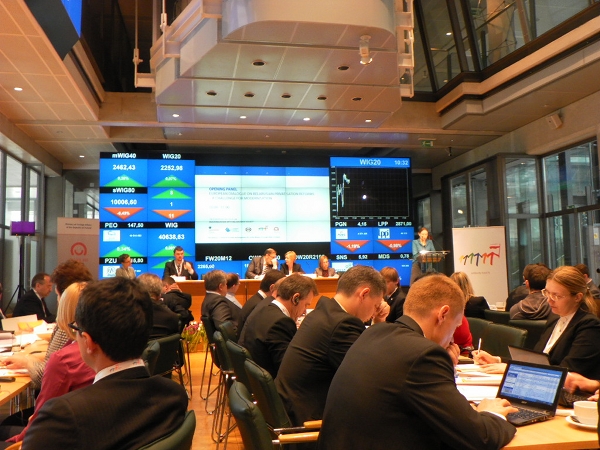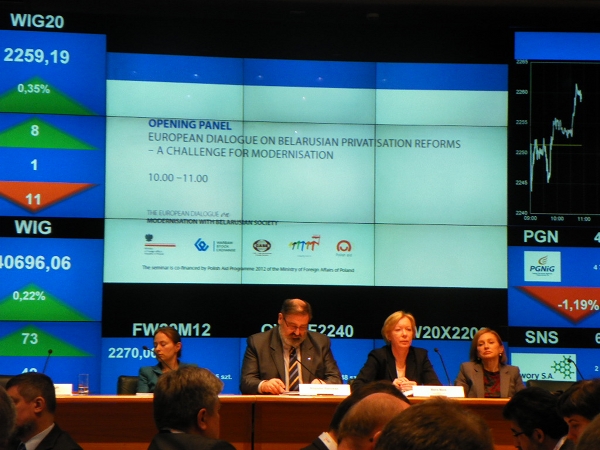Changes in Belarus are possible any time
59- 18.04.2012, 8:10

And one should be ready for that.
It was stated in an interview to charter97.org after the seminar “Privatization and Private Entrepreneurship” held in Warsaw on April 16-17 by the head of the Polish Foundation of International Solidarity, a former Deputy Foreign Minister of Poland Krzysztof Stanowski. The seminar was a part of the EU’s new initiative for Belarus “European dialogue with the Belarusian society for modernization.”
“I am sure that this initiative is very important. It is the first seminar, and we have created a format for the future. For the European Union it is a way to understand which relations could be with the countries which are undoubtedly authoritarian. Unfortunately, Belarus is not the only country with an authoritarian regime, and so far there have not been common experience of the EU (just of separate countries). It is important for us on the one hand to understand how we should cooperate with the civil society of Belarus, and on the other hand, to influence the government.
Our experience shows that economic changes, political changes are necessary in the first days after the reversal of the situation. And the success of Balcerowicz’s reforms was among other things connected with the fact that they had been prepared and were carried out immediately after the democratic government took over. The package of 10 laws was adopted by the parliament in the first 90 days. And it was a success.
Why we were discussing privatization in Warsaw? On the one hand, there is an experience of Poland, of such people as Leszek Balcerowicz. On the other hand, we understand that the question of economic independence is a question of independence in general. As even if people are independent politically, but they have no economic independence, they get into bondage. And democracy could be stable when people are independent in the economic aspect as well. So it seems to us that this reform is among the most important ones. And we always ask our Belarusian friends not who is going to be a president – this person is to emerge – but who is going to be the head of the National Bank, who would be in charge of power ministries, who would be in charge of the economy ministry. These ministries will be the most important ones in the moment of change.
In a few weeks before the “Arab spring” the best analysts did not even begin to think that changes were possible in Tunisia. They said: it is true for Yemen, the situation is more explosive there. A year before the changes in Poland no one was sure that we would live in a free country. It is clear that we had been doing everything in power to make it reality. And it can happen in any moment, so it is very important for the civil society of Belarus and the international community to be ready,” Krzysztof Stanowski stated.
During the seminar Belarusian and international experts discussed peculiarities of the Belarusian economic situation, in particular, the specific nature of privatization processes.
“Cooperation of European structures and the government on Belarus’ modernization is dead-end. It is a modernization “from above”, through influence on the government. We know who determines the policy of the government and how it is done. It is very difficult to change from above, and I believe Belarus should change from below, through creating a critical mass of owners, that is, of a middle class. Lukashenka cannot be rectified. He is convinced that government ownership is good. He can sell it. He can “bend” people, as he calls it. And I am more than sure that it is impossible to change him,” said the head of the Business Union of Entrepreneurs and Employees named after Professor Kunyauski, a former Economy Minister of Belarus Ryhor Badzej (Grigoriy Badej).
At the seminar in Warsaw representatives of the World Bank presented a pilot project on privatization in Belarus.
“We want to work with small and medium-sized companies, in order to test how privatization in Belarus can work. We believe that the most important thing is not imply to sell an enterprise, but to sell it into the right hands, to the best investor, who would be able to integrate the enterprise into the world market. And the key thing is not just get money from the sale, but for the business to continue its work and provide benefit. This project is to work for two years,” said Andrea Dall'Olio, a Senior Economist for Europe and Central Asia Department of the World Bank.
A representative of the CASE - the Center for Social and Economic Research, Professor Piotr Kozarzewski, told about the existing problems of privatization in Belarus.
“Four questions of principle are faced by the Belarusian privatization. The first question is: to decide what for the privatization is needed specifically. The Belarusian authorities are interested in the financial aspect exclusively, by search of money for the budget. However, the number one issue is to improve functioning of the economy.
The second problem is to find owners to improve the state of the economy. Experience shows that the most effective owners are large foreign investors, who bring not only capital, but knowledge, new technologies.
The third problem is the place of privatization in the economic policy. Privatization in Belarus is an isolated policy, which is carried out separately from functioning of the economy in general, and for privatization to be successful, conditions should be created for arrival of an investor, an attractive investment climate. Otherwise investors who will come, would be oligarchs aimed at quick profits, and not at long-term investing.
The fourth problem is the following: it is extremely important to choose the methods of privatization, which would attract the investors necessary for us. There should be clear, transparent and manageable procedures. De-bureaucratization of this process is needed,” Professor Kozarzewski stated.
An analyst of the Center for Social and Economic Research (CASE) Dmitry Babitski agreed to him.
“On the one hand, part of the business, even Belarusian one, is ready to invest in state-owned enterprises. And it seems that the state is ready to sell them. But it is ready to sell to home investors not what yields profit, but what is not used already. But even this goes wrong to some extent. There are several reasons for that.
Obstacles could be subdivided into institutional ones: such as unfair competition, when the state sector has preferences; there are problems with judicial system, taxes, there is no macro-economic stability. And there are a number of local obstacles, encountered by investors. Institutional impediments put off from a desire to invest, but if a person still wants to invest, the following problems are awaiting him. it is difficult to understand the privatization process itself, to find an object, there are great problems with technical documents, architecture and construction plans; there are also red tape barriers and corruption,” Babitski said.
One of the directors of the CASE Sergei Navrodski is content how the first seminar of the initiative has been held:
“Highly professional people from such organizations as the World Bank, the Organization for Cooperation and Economic development (OCEP), the European Commission, have gathered here. They really work for the changes in Belarus to happen. They have arrived to share their experience and understand what is going on in our country. It is important for us for Belarus to become a part of the world process of reforms.”











